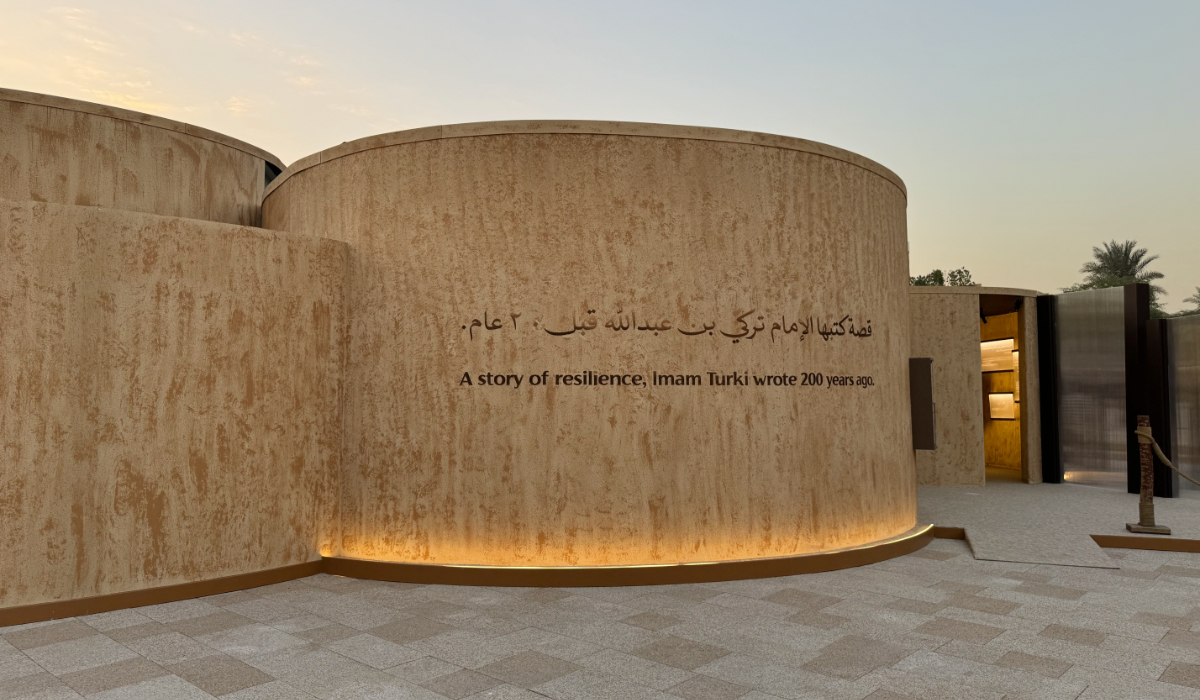SANAA, Yemen: Yemeni officials say the Houthi militias have released two sons of the late former President Ali Abdullah Saleh.
The officials, who spoke Wednesday on condition of anonymity because they were not authorized to brief media, say Omani officials and the UN envoy to Yemen, Martin Griffiths, helped negotiate the release of Salah and Madian Saleh. The officials say the two sons were being flown to Jordan’s capital, Amman.
The sons have been in custody since the Houthi militias killed Saleh, their onetime ally, when they gained the upper hand in days of fighting with Saleh’s forces for control of the capital, Sanaa, in December 2017.
The Iran-aligned Houthis have been at war with a Saudi-led coalition since March 2015.
Yemeni officials: Houthi militias release slain ex-president’s sons
Yemeni officials: Houthi militias release slain ex-president’s sons

- The officials say the two sons were being flown to Jordan’s capital, Amman
Diriyah Season exhibition honors symbols of Saudi resilience

- Imam Turki bin Abdullah’s legacy explored in immersive display for Second Saudi State’s bicentennial anniversary
RIYADH: Diriyah Season’s “Enduring Resilience” exhibition highlights the life of ruler Imam Turki bin Abdullah in celebration of the 200th anniversary of the establishment of the Second Saudi State.
“I enjoyed the exhibition. I honestly think that exhibitions like this are so important because they show Saudi history and the bravery of important people of the past, such as Imam Turki bin Abdullah,” said Maha Al-Aamri, a Saudi visiting the exhibition being held at Diriyah’s Bujairi Terrace with her friends.

Speaking about what stood out to her, she said, “All of it … The storytelling about Al-Ajrab Sword was probably the best part of the exhibition.”
Al-Ajrab Sword is one of the most well-known symbols of the Kingdom’s history, representing the courage, determination, and nobility of Imam Turki in unifying and restoring the sovereignty of the Second Saudi State in 1824 when he entered Riyadh.
HIGHLIGHTS
• Al-Ajrab Sword is one of the most well-known symbols of the Kingdom’s history.
• It represents the courage, determination, and nobility of Imam Turki bin Abdullah in unifying and restoring the sovereignty of the Second Saudi State in 1824.
Through the exhibition, visitors are transported back in time through a guided and immersive journey that explores how Imam Turki established and shaped the Second Saudi State, reclaiming the land and restoring the legacy of his ancestors.

“The experience was very nice and something different to try,” Vindeep Gupta, a computer technician working and living with his family in Riyadh, told Arab News.
“I will just say that I wish it (the exhibition) was bigger, but I like that it captured the struggles and challenges in achieving the victory … The historians did a good job in making the display,” he said.

Among the areas of the exhibition where visitors noticeably spent more time taking pictures and videos was Turki’s Cave.
According to a document published by the Diriyah Gate Development Authority, Imam Turki sought refuge in a cave high atop a rugged mountain, choosing it as his base of operations. The cave, located in Aliyyah, became one of the most well-known in Najd.

Its inaccessibility made it a perfect hideout, strategically situated near several key towns and villages including Al-Kharj, Al-Houtah, Al-Hareeq, Al-Hulwah, and Al-Dalam.
The exhibition, in Arabic with English translation, is open to the public until the end of the year. It offers a deeper understanding of the values of unity, belonging, justice, and loyalty that were exhibited by the imams of the state.
Saudi royal reserve inaugurates Al-Tawil Camp

- King Salman bin Abdulaziz Royal Natural Reserve is the largest natural reserve in Saudi Arabia
RIYADH: The King Salman bin Abdulaziz Royal Reserve Development Authority on Thursday inaugurated Al-Tawil Camp, nestled amid the stunning rocky and mountainous formations within the reserve in the Jouf region.
The camp features 15 fully equipped accommodation units, designed to offer visitors a tranquil and immersive experience.
Guests can enjoy breathtaking views of the surrounding landscape from their tents, participate in outdoor activities, and immerse themselves in the beauty of nature.
Al-Tawil Camp offers a range of experiences, including stargazing, hiking, live music performances, and opportunities to learn about the reserve’s rich biodiversity.
King Salman bin Abdulaziz Royal Natural Reserve is the largest natural reserve in Saudi Arabia.
It is known for its pristine nature, fresh air, geographic and heritage diversity, and rare monuments dating back to about 8,000 B.C.
Located in the north of Saudi Arabia near the border with Jordan, consists of three primary conservation areas: Khunfah, Tubaiq, and Harrat Al-Harra.
Falcons take center stage at Riyadh festival

- Tourists and visitors praised the event’s seamless organization, as well as its blend of entertainment and education
RIYADH: Visitors enjoyed watching and learning about falcons at the King Abdulaziz Camel Festival recently.
The display was part of a “Hadad Al-Soqoor Experience” showcasing authentic Saudi culture at the festival site in the Al-Sayahid desert.
A variety of falcon species, including the peregrine falcon and the gyrfalcon, both symbols of Saudi heritage, were featured in a pavilion display that highlighted the rich falconry culture that has been part of Bedouin life in the Kingdom for centuries.
The falconer supervising the pavilion said that raising falcons is a proud legacy passed down through the generations, serving as both a source of inspiration and a means of livelihood through participation and trade.
He pointed to a growing interest among the young in acquiring falcons, evidence of falconry’s enduring appeal.
Tourists and visitors praised the event’s seamless organization, as well as its blend of entertainment and education.
The opportunity to be photographed with falcons was also part of the festival’s broader initiative to celebrate and promote Saudi cultural heritage.
Black limes: a unique staple of Middle Eastern and North African cuisine

- Dried citrus adds zesty kick to dishes
- Originated as a way to preserve fruit in hot climes
RIYADH: Anyone who has not yet dived into the world of black limes is in for a treat. Known in English as dried limes or black lemons, these intriguing ingredients are referred to as noomi basra in Iraq, limoo amani in Iran, and loomi in Saudi Arabia and Oman.
They are a must-have for elevating culinary creations and have graced dishes across the Middle East and North Africa for more than 1,000 years. It’s about time they were brought into every kitchen.
So, what exactly are black limes? Think of them as the sophisticated cousins of fresh limes. They undergo a transformation process: first, they are packed in salt, and then they bask in the sun until they turn a striking black.

The result is a hard, dried fruit that delivers a remarkable burst of flavor.
When it comes to taste, black limes pack a powerful punch. The flavor is a harmonious blend of sour and slightly sweet, rounded out by a touch of bitterness.
“It was a game-changer to realize that (adding black lime) isn’t just about adding tanginess to a dish — it’s a full-on spice with a smoky aroma and earthy notes that bring out so much flavor,” Shadia Al-Bayat — a home cook from Qatif — told Arab News.
“Beyond that, it’s packed with nostalgia, calling to mind traditional Gulf dishes like seafood, grilled meats, and hearty stews. It’s also the key to the signature hot ‘loomi’ tea, a staple at traditional gatherings and celebrations,” Al-Bayat added.
FASTFACTS
• Black limes are packed in salt and then they bask in the sun until they turn a striking black.
• They add a zesty kick to Saudi dishes; they originated as a way to preserve fruit in hot climate.
This unique profile makes them perfect for enhancing stews, tagines and a variety of other dishes. A black lime added to a cooking pot will instantly elevate any meal.
Cooks can get creative with black limes. They can be used whole or crushed into powder, allowing for versatility.
Imagine a flavorful tagine or a warming soup that gets a delightful kick from a black lime. If preferred, the lime can be removed before serving, but leaving it in adds an appealing touch.
For something refreshing, blend black limes into limonana, a delightful drink that combines lemon and mint, perfect for quenching thirst.
And for something soothing, consider brewing some dried lime tea — a comforting drink that can settle the stomach and provide a sense of warmth.
They also make excellent additions to marinades for meats and fish, giving dishes a fantastic zest.
In Saudi cuisine, loomi is a prized ingredient that adds a distinctive tangy flavor to traditional dishes.
In kabsa, a popular rice dish, black lime is added whole or ground to add acidity and elevate the dish’s depth.
Black limes have a history that dates back centuries. They are believed to have originated in the Middle East and North Africa, where they were a valued ingredient in ancient cooking.
Historically, they were prized not just for their flavor, but also for their ability to preserve food in the warm climate. Over time, dried limes became a staple in various cuisines, with each culture adding its own flair to their use.
Today, they are recognized for their versatility and are celebrated in dishes in many cultures.
Beyond their culinary charm, black limes come with health benefits, too. Packed with vitamin C, calcium and potassium, they are a nutritious addition to any diet.
Black limes are a cultural staple. While they share ties with fresh limes, black limes have a distinct personality, bringing an intriguing bitterness and complexity to dishes.
They can even be spotted in spice blends like baharat, because a little extra flavor never hurt anyone.
Black limes are a unique and flavorful ingredient that can bring depth to cooking and are worth adding to any culinary repertoire to impress the taste buds.
Where We Are Going Today: ‘Yum-A-Sama’ – a sushi spot in Riyadh

- Pricing is reasonable, making it an attractive option for regular orders
Yum-A-Sama has quickly established itself as one of the top sushi spots in Riyadh, operating as a cloud kitchen that consistently delivers fresh treats.
The raw salmon is incredibly delicious, and the tuna is equally impressive. A must-try item on the menu is the torch salmon nigiri. Each dish showcases the freshness of the ingredients, making it a delight for sushi lovers.
In addition to sushi, Yum-A-Sama offers a variety of salad bowls that are generously portioned. Options include crab salad, chicken salad, and a veggie salad bowl for those seeking vegetarian choices. This variety ensures that there’s something for everyone, whether you’re in the mood for sushi or a refreshing salad.
Pricing is reasonable, making it an attractive option for regular orders. I find myself ordering from them twice a week because the quality remains consistent, and the food is always fresh. This reliability is a significant factor in why many customers keep returning.
Yum-A-Sama also features some unique signature dishes that are worth exploring.
Items like the spicy mango sushi, sunset salmon, special crab, samurai fry, and pink tara are just a few of the creative offerings that set this restaurant apart from others in the area.
For convenience, Yum-A-Sama can be easily ordered through popular delivery apps, allowing customers to enjoy their favorite dishes without hassle.
Overall, the combination of quality, variety, and reasonable pricing makes this outlet a go-to choice for those craving delicious sushi in Riyadh.




















